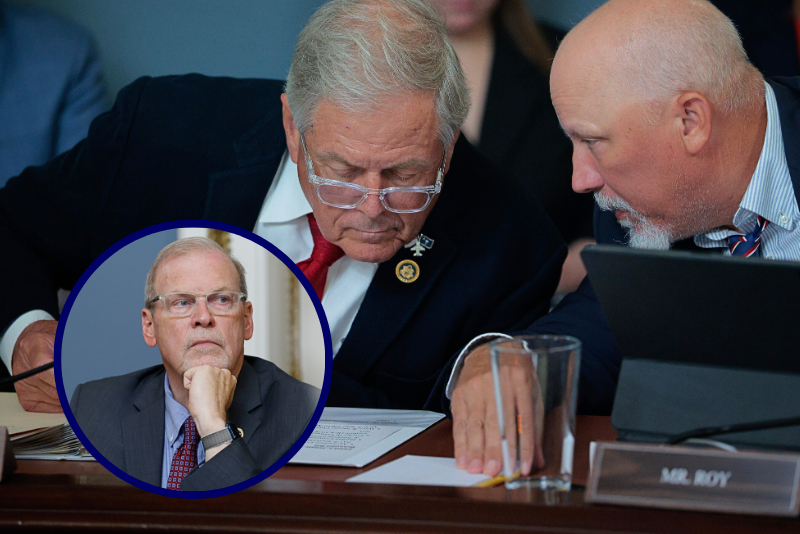
OAN Staff Brooke Mallory
5:24 PM – Tuesday, September 9, 2025
The House is poised to vote on an amendment to repeal two long-standing Authorizations for the Use of Military Force (AUMFs) in Iraq. This comes after three members of the House Freedom Caucus broke with GOP leadership on the Rules Committee this week.
An AUMF is a joint resolution passed by Congress that gives the president the legal authority to use military force without a formal declaration of war. It is Congress’ way of saying: You can use the military in these circumstances.
On Tuesday, the clash unfolded as the panel, which controls which amendments reach the House floor, finalized debate terms for the 2026 National Defense Authorization Act.
Advertisement
Reps. Ralph Norman (R-S.C.), Chip Roy (R-Texas), and Morgan Griffith (R-Va.) sided with Rep. Jim McGovern (D-Mass.), the committee’s top Democrat, in supporting a motion to allow a vote on repealing the 1991 and 2002 AUMFs.
The Committee also approved a structured rule for H.R. 3838, the National Defense Authorization Act (NDAA) for Fiscal Year 2026, by a 9-4 record vote. The structured rule controls which amendments may be offered, their debate limits, and how they are considered.
The House later agreed to the rule with narrow margins — 210-207 on the rule, 213-207 on the previous question motion. The votes highlight how tightly controlled consideration of defense legislation remains, even amid procedural rebellion.
Republicans on the Rules Committee typically shut down Democrat proposals. However, in this case, the amendment advanced on a 7–4 vote, with all Democrats and the three GOP “rebels” in favor, and the remaining Republicans opposed.
Supporters of the repeal argue that the AUMF is outdated and that new, tailored authorizations should be drafted for contemporary threats.
The situation is also being painted as a rare act of defiance inside the Rules Committee, a key arm of GOP leadership where Republican members are handpicked by the speaker. In recent years, however, a bloc of lawmakers on the panel have held enough sway to occasionally upend leadership — leverage they won in concessions from former Speaker Kevin McCarthy (R-Calif.) during his battle to secure the gavel.
The Rules Committee remains a linchpin in the legislative process, shaping what bills reach the floor and under what terms. It’s considered a key arm of GOP leadership precisely because the speaker traditionally places loyalists or those aligned with them in the committee to control proceedings. The committee itself maintains that it protects U.S. security interests by keeping reckless amendments off the floor.
Rep. Roy who has co-sponsored legislation with House Foreign Affairs Committee ranking member Gregory Meeks (D-N.Y.) to repeal the authorizations, argued that Congress should replace the outdated AUMFs with a new one tailored to today’s threats.
“The AUMF repeal is strongly opposed by the, I’ll call it, defense hawk community,” Roy said. “Maybe, just crazy talk here, 23 years after the AUMF was passed in ‘02 to deal with Iraq and Saddam Hussein and that guy’s been dead …. and we’re now still running under an ‘02 AUMF. That’s insane. We should repeal that.”
Opposition has been vocal as well.
Rep. Joe Wilson (R-S.C.) warned in a social media post that repeal “would tie the President’s hands in going after Iranian puppet militias in Iraq, endangering American families,” adding it is “the same provision that President Trump used for the authority to kill terrorist leader Qassem Soleimani.”
Meanwhile, House Majority Leader Steve Scalise (R-La.) signaled that leadership is bracing for a contentious floor fight.
“AUMFs always have been heated discussions, and we’ve had them a number of times in the past. I think it’s a healthy discussion to have about the difficult decision on when to engage and what are the rules of engagement,” Scalise said. “I’m sure we’re going to have a heated debate on the floor.”
The House passed a bill to repeal the 2002 AUMF in 2021, while the Senate voted last year to strike both the 2002 and 1991 authorizations.
However, others argue that AUMFs aren’t “outdated,” and their continuing role in protecting Americans abroad is highly important.
Despite repeated efforts by Democrats and some Republicans to dismantle the Iraq war authorizations, critics warn such moves ignore ongoing threats in the region — and a repeal could embolden Iran and other terrorist groups. They argue that a repeal could send a dangerous signal of weakness to Tehran and its proxy militias.
Lawmakers, such as Rep. Joe Wilson (R-S.C.), have highlighted that the 2002 AUMF provided part of the legal authority for eliminating Qassem Soleimani, the Iranian commander responsible for orchestrating attacks on U.S. troops and allies. In 2020, Soleimani had been traveling with Iraqi militia leaders when their convoy was targeted by U.S. missiles fired from an aircraft.
Nonetheless, the 2002 AUMF wasn’t the only legal authority for the Soleimani strike, as the administration also relied on the president’s constitutional Article II powers.
Stay informed! Receive breaking news blasts directly to your inbox for free. Subscribe here. https://www.oann.com/alerts
What do YOU think? Click here to jump to the comments!
Sponsored Content Below

















